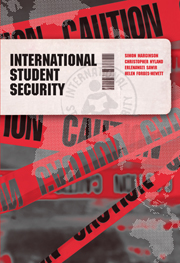Book contents
- Frontmatter
- Contents
- List of figures
- List of tables
- About the authors
- Preface
- PART 1 Students in the global market
- 1 The students
- 2 The setting: Australia
- 3 The global student market
- 4 Student security and regulation
- PART 2 Security in the formal and public domain
- PART 3 Security in the informal and private domain
- PART 4 Protection and empowerment
- References
- Index
4 - Student security and regulation
Published online by Cambridge University Press: 05 August 2012
- Frontmatter
- Contents
- List of figures
- List of tables
- About the authors
- Preface
- PART 1 Students in the global market
- 1 The students
- 2 The setting: Australia
- 3 The global student market
- 4 Student security and regulation
- PART 2 Security in the formal and public domain
- PART 3 Security in the informal and private domain
- PART 4 Protection and empowerment
- References
- Index
Summary
We're basically seen as cash cows and that's something that should change.
~ male, 33, PhD in medicine, SpainINTRODUCTION: STUDENTS CHANGING THEMSELVES
Human beings are complex creatures. Amartya Sen points out that ‘We all have multiple identities, and … each of these identities can yield concerns and demands that can significantly supplement, or seriously compete with, other concerns and demands arising from other identities’. Each person must navigate these multiple identities. For those who cross borders the complexities and tensions are greater. The transitional character of the study experience, and the large communities in which it plays out, opens all international students to changing associations and new kinds of self, rendering their human security more chancy and unstable.
As Pedersen puts it, ‘the multicultural person is always recreating an identity as roles are learned, modified or discarded in each discontinuous situation’. While not many international students change their basic values, objectives or commitment to their country, most tend to adopt attitudes ‘favouring greater open-mindedness, the value of knowledge, and greater freedom in the relationship between sexes’. This response is almost inevitable. It is difficult to accommodate the new environment without becoming more flexible.
- Type
- Chapter
- Information
- International Student Security , pp. 53 - 80Publisher: Cambridge University PressPrint publication year: 2010



